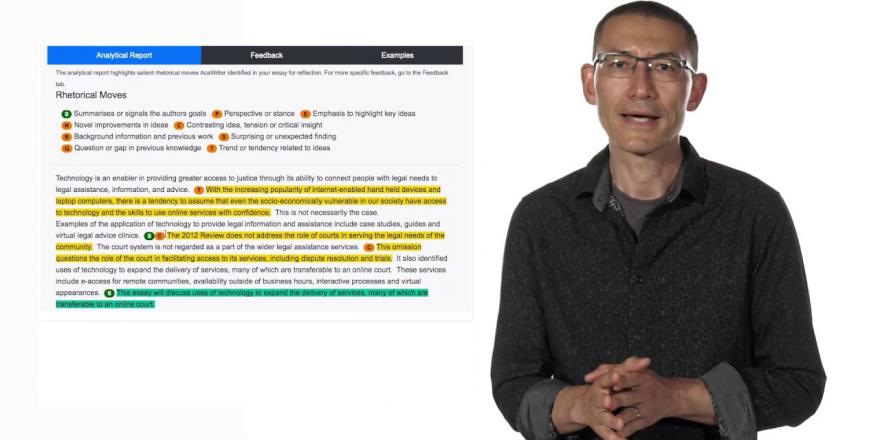Using AcaWriter in your teaching

Hi — this video is to help you, as an educator, decide whether to introduce AcaWriter into your teaching, or PhD supervision.
As you’ll have gathered, students can now have instant feedback of a new sort on their drafts, 24/7. AcaWriter goes beyond the usual spelling, grammar and plagiarism checking, and focuses instead on the hallmarks of academic writing. Students can move beyond someone else’s examples of good and poor writing, and see their own writing annotated.
But since this is a new kind of tool — in fact, one that neither you nor your students will have used before — you may be wondering how to introduce it in a way that maximises its benefits, and minimises the risks.
Well, we’ve developed a method for working with educators — some of whom are in the videos on this site — and what’s exciting is that once they tried AcaWriter, they all chose to continue using it.
What’s the key? Well, it must be made obvious to students why AcaWriter is relevant. Firstly, because it fits closely with the task you give them — because the language and assessment criteria you use when describing good writing are all echoed and reinforced by AcaWriter. Second, the writing task you give them asks them to demonstrate that they have reflected on and acted on AcaWriter’s feedback.
Just to be clear, the polar opposite way to use AcaWriter would be to just mention that there’s a new tool they can try out, with no obvious alignment to your assignment. All the research shows that it will be conveniently ignored!
So, what we invite you to do is browse the teaching examples on this website to learn more about how your colleagues have embedded AcaWriter into effective writing improvement tasks. This makes very concrete how assignments, rubrics and AcaWriter can be synchronised. It also shows the joint research papers that flow from our collaborations.
We hope this excites you! If you’re interested to know more, then please get in touch, and we look forward to welcoming you to the AcaWriter educator community!
At university we want to teach students how to think — and to make that thinking visible so that others can engage with their ideas. That thinking is often conveyed in writing, making academic writing a critical skill for university level study. Whether graduates pursue academic or other careers, they need to be highly articulate with words. However, most academics are experts in their field, but not in coaching writing, and it is here that AcaWriter has found its niche, providing instant feedback to students to provoke reflection on their drafts, prior to submission.
Students gave a lot of positive feedback around the fact AcaWriter is automated. I think that's an important part of the story because we're saying to students, 'Paste your essay into this tool and then it's going to give you feedback because your lecturer doesn't have enough time to do that for you.
What do we mean by academic writing? Analytical writing focuses on ideas and arguments, and is generally formulated in a formal academic or professional style (such as a journal paper, or business analysis). In contrast, reflective writing focuses on a student’s response to challenging experiences (e.g. from an internship), and is more personal, written in the first-person (using “I” or “my”) like a diary entry. Reflective writing may also include analytical elements (e.g. contrasting one’s experience with a theory, or a case study in the literature).
We've seen an overall improvement in the student's written communication. Students' individual assignment pass-rate is increasing. We're also seeing improvements in the quantity of students who are either meeting, or exceeding, the expectations around written communication.


